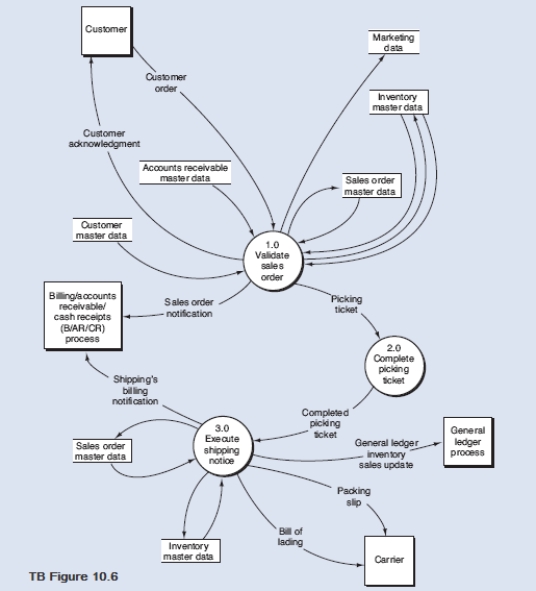Below is the narrative of the "Execute shipping notice" portion of the order entry/sales process.Narrative Description
This narrative describes activities that normally take place in a shipping department.Process 3.1 receives two data flows, namely, the completed picking ticket and data retrieved from the sales order master data.The shipping clerk matches the quantity of the goods, the quantity on the picking ticket, and the quantity stored in the sales order data.If the details agree, the matched sales order is forwarded to process 3.2.If the details of the data flows do not agree, process 3.1 rejects the order and initiates procedures for resolving any discrepancies.When process 3.2 receives a matched sales order from process 3.1, it produces and disseminates notices of the shipment and updates the sales order and inventory master data.The sales order master data is updated to reflect that the goods have been picked, packed, and shipped.The inventory master data is updated to change the quantity allocated for the sales order to an actual shipment, thus reducing the quantity of inventory on hand.We generally expect the dissemination of notices will include the following data flows:
-Shipping notifies billing to begin the invoicing process.-A bill of lading, which is a contract between the shipper and the carrier in which the carrier agrees to transport the goods to the shipper's customer.The carrier's signature on the bill of lading, or the customer's signature on some other form of receipt, substantiates the shipment.-A packing slip is inserted into the package (a copy may be attached to the outside of a package) and identifies the customer, the shipment destination, and the contents of the package.-General ledger inventory sales update to notify the general ledger process that inventory has been sold and the cost of goods sold has increased.Required:
From the DFD in TB Figure 10.6 and the narrative description above, explode bubble 3.0 into a lower-level diagram showing the details of that process. 
Definitions:
Ratio Comparison
A method of analysis where financial ratios of a company are compared to industry benchmarks or the company's historical figures to assess performance.
Credit Manager
A professional responsible for granting credit to customers and managing the credit risk for a company.
Quick Ratio
A liquidity indicator that measures a company’s ability to pay off its current liabilities without relying on the sale of inventory by dividing liquid assets by current liabilities.
Return on Equity
A measure of a corporation's profitability relative to stockholders’ equity, indicating how effectively management uses investments to generate earnings growth.
Q9: The _ data is the repository of
Q10: The section of Sarbanes Oxley that makes
Q20: Not knowing whether input data has been
Q24: With _ the data entry clerk compares
Q25: _ are particularly important because they relate
Q34: In a(n) _ accounts receivable system, the
Q46: Systems documentation provides an overall description of
Q95: A true _ system requires that all
Q96: Which of the following is not an
Q106: _ applications in organizations are usually viewed